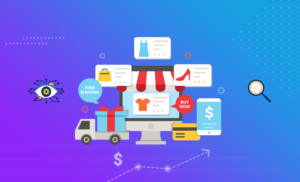The Difference Between ECommerce Store and Online Marketplace

With the dawn of the digital age, electronic business and all kinds of online money-making processes are becoming increasingly employed. Most of the activities in our everyday lives have long been transferred to the Internet, including things like shopping.
The latter has brought along the emergence of eCommerce and, with it, marketplaces. Interestingly, few know the difference between the two. To get a clear understanding, we should first consider each of the terms separately.
What Is ECommerce?
ECommerce is an area of e-business that refers specifically to commercial operations of selling physical goods or services through the Internet. An eCommerce platform would be any platform that enables a business activity such as Internet marketing, automated data collection systems, supply chain management, etc.
Types of eCommerce models include:
- Business to Consumer (B2C): a business selling goods to a regular consumer (e.g., selling beauty products from an online store);
- Business to Business (B2B): a business selling products to other businesses (e.g., a copywriting business selling original content for another business to use);
- Consumer to Consumer (C2C): a consumer selling goods to other consumers (e.g., selling your hand-made jewelry online);
- Consumer to Business (C2B): a consumer sells products for businesses to use (e.g., a composer selling the rights for their song to a music performer).
What Is a Marketplace?
An online marketplace is a type of eCommerce website where multiple sellers can distribute their goods directly to the buyer using a convenient market-type of ground for commercial activities. Money transfers in such organizations are processed through the marketplace operator and terminate with participating retailers. In a way, a marketplace is a platform for businesses eager to sell and distribute their services or products that don’t have their own dedicated eCommerce resource for that.
All marketplaces are kind of eCommerce stores because they are online businesses where goods are sold through the web. However, not all eCommerce stores are marketplaces – they are usually oriented at one or two brands and might as well be online currency exchanges, catalogs, etc. An example of an eCommerce store would be iTunes store or Walmart, while eBay and Airbnb are marketplaces.
Some key features that should help distinguish a marketplace from an eCommerce store:
- Marketplaces aggregate their products from a wide range of providers. While in an eCommerce store there is only one provider that must supply the catalog with products, a marketplace usually does not have the problem of filling the catalog with goods, leaving the task to the sellers that use the platform.
This also means that a marketplace is much more economical since it does not have to invest significant amounts of money in filling up the shelves in the catalog – all of that is done by the sellers. There is no need to purchase stocks. An eCommerce, being a service only used for the distribution of one company’s goods, will have to put in a lot of money to start up the store.
- Money transfers in marketplaces are more transparent. Marketplaces provide consumers with an option of making a purchase without a middleman in the transaction chain. The supply, in this case, goes directly from the seller to the buyer.
In contrast, with eCommerce stores, the buyer first reaches the distributor or a retailer that then works with the supplier. This means the goods sold will be more expensive since the retailer will want to make some profit off the purchase as well. With a marketplace, all the profit goes to the seller, with only a ‘post-selling’ fee from the platform.
What is OpenСart?
OpenCart is an accessible and simple platform that will allow you to create your own unique marketplace from scratch. We provide an easily manageable staging for your online shop with an option of switching from a single-seller store to a marketplace open for multiple agents.
Our services are available for everyone, regardless of their skills in IT, and require no previous knowledge of coding. We offer the highest quality tools for construction and effortless maintenance of your e-business.
Some of our features include the following:
- Admin portal with a well-equipped interface that will provide you with all the tools to set up and handle your marketplace with no necessary knowledge of coding;
- Merchant portal to help sellers manage their stores and products through the Dashboard;
- Customizable homepage for maximum personalization of the front of your marketplace – add your logos and headlines with a snap;
- Varying payment options with the built-in PayPal integration and trackable proceeds;
- The option of choosing the language of your interface to make your marketplace available to foreign buyers;
- Viewing of the seller’s profile and writing reviews, open to users at all times;
- Transparent communication between vendors and customers via email and feedback on the site;
- Numerous shipping methods that can be customized by merchants;






